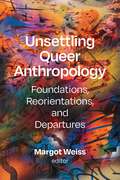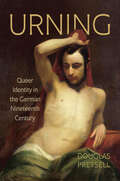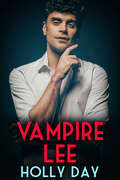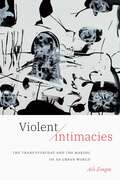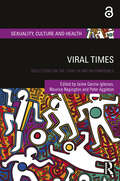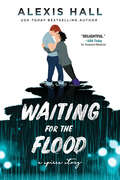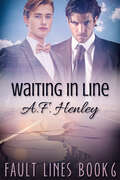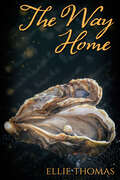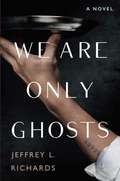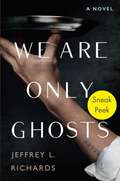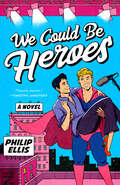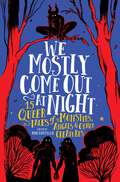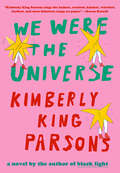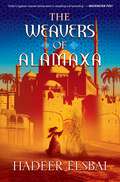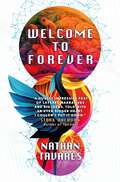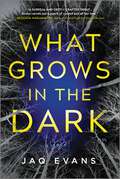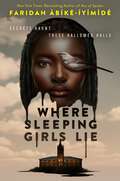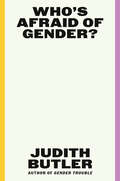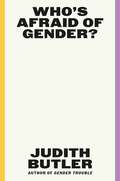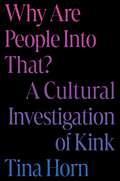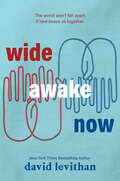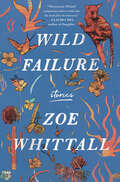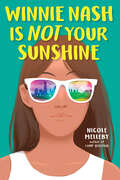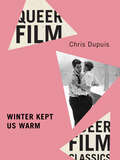- Table View
- List View
Unsettling Queer Anthropology: Foundations, Reorientations, and Departures
by Margot WeissThis field-defining volume of queer anthropology foregrounds both the brilliance of anthropological approaches to queer and trans life and the ways queer critique can reorient and transform anthropology. Consisting of fourteen original essays by both distinguished and new voices, Unsettling Queer Anthropology advances a vision of queer anthropology grounded in decolonial, abolitionist, Black feminist, transnational, postcolonial, Indigenous, and queer of color approaches. Critically assessing both anthropology’s queer innovations and its colonialist legacies, contributors highlight decades of work in queer anthropology; challenge the boundaries of anthropology’s traditional methodologies, forms, and objects of study; and forge a critical, queer of color, decolonizing queer anthropology that unsettles anthropology’s normative epistemologies. At a moment of revitalized calls to reckon with the white supremacist and settler colonial logics that continue to shape anthropology, this volume advances an anthropology accountable to the vitality of queer and trans life.Contributors. Jafari Sinclair Allen, Tom Boellstorff, Erin L. Durban, Elijah Adiv Edelman, Lyndon K. Gill, K. Marshall Green, Brian A. Horton, Nikki Lane, Martin F. Manalansan IV, Shaka McGlotten, Scott L. Morgensen, Kwame Otu, Juno Salazar Parreñas, Lucinda Ramberg, Sima Shakhsari, Savannah Shange, Anne Spice, Margot Weiss, Ara Wilson
Urning: Queer Identity in the German Nineteenth Century
by Douglas PretsellIn 1864, the German jurist Karl Heinrich Ulrichs coined the term “urning” as a word for same-sex attracted men. Over the next few years, first anonymously and then publicly, he campaigned against the public persecution of these men. In response, some of his readers took on the urning terminology for themselves and engaged with Ulrichs to negotiate the finer points of their new identities. In Urning, Douglas Pretsell writes of same-sex attracted men in German-speaking Europe who used the neologism “urning” as a personal identity in the late nineteenth century. This was in the period before other terms such as “homosexual” gained currency. Drawing on letters, memoirs, and psychiatric case studies, the book uses first-hand autobiographical accounts to map out the contours of urning society. Urning further explores individual accounts of some urnings who attempted their own forms of activism to transform the world around them , even though they had no formal organization. As the century drew to a close, the efforts of Ulrichs and his urning followers paved the way for the launch of the world’s first homosexual rights organization. Urning argues that the men who called themselves urnings were self-identified, self-constructed agents of their own destinies.
Vampire Lee
by Holly DayCan you chase away imaginary monsters with real life monsters?Dillon Ross lives in a huge mansion together with six other people. Four of them turn furry, one drinks blood regularly, and one is a former blood slave, just like him. Seven months ago, he was rescued from a fate worse than death, and he’s been doing his best to avoid people ever since. Which is hard when you have well-meaning but nosy roommates.Lee Dowell is a vampire working in a shifter bar. One day, he hears something he wasn’t meant to hear, and while his first reaction is to ignore it, he reaches out to the supernatural version of the police. It might not have been his smartest move, since he now has a target on his back.Dillon isn’t pleased to realize he is sharing a floor with a vampire. There are enough monsters in his head, he doesn’t need one in his space too. But Lee has put himself in danger by trying to help some people held captive, and his roommates are trying to keep him safe. Lee doesn’t do humans, but when Dillon’s nightmares wake him time and time again, he wants nothing more than to gather him in his arms and chase away his fears. But can you chase away imaginary monsters with real life monsters?
Violent Intimacies: The Trans Everyday and the Making of an Urban World
by Asli ZenginIn Violent Intimacies, Aslı Zengin traces how trans people in Turkey creatively negotiate and resist everyday cisheteronormative violence. Drawing on the history and ethnography of the trans communal life in Istanbul, Zengin develops an understanding of cisheteronormative violence that expands beyond sex, gender and sexuality. She shows how cisheteronormativity forms a connective tissue among neoliberal governmentality, biopolitical and necropolitical regimes, nationalist religiosity and authoritarian management of social difference. As much as trans people are shaped by these processes, they also transform them in intimate ways. Transness in Turkey provides an insightful site for developing new perspectives on statecraft, securitization and surveillance, family and kin-making, urban geography, and political life. Zengin offers the concept of violent intimacies to theorize this entangled world of the trans everyday where violence and intimacy are co-constitutive. Violent intimacies emerge from trans people’s everyday interactions with the police, religious and medical institutions, street life, family and kinship, and trans femicides and funerals. The dynamic of violent intimacies prompts new understandings of violence and intimacy and the world-making struggles of trans people in a Middle Eastern context.
Viral Times: Reflections on the COVID-19 and HIV Pandemics (Sexuality, Culture and Health)
by Jaime García-Iglesias Maurice Nagington Peter AggletonThis book explores the relationship between COVID-19 and AIDS. It considers both how the earlier HIV pandemic informed our engagement with COVID-19, as well as the ways in which COVID-19 has changed how we remember and experience AIDS.Individual sections focus on sexual and intimate relationships, inequalities and injustice, the progressive biomedicalisation of the response (in the absence of a vaccine or effective treatment or cure), and professional, practitioner and community perspectives on the pandemics. The authors come from a wide variety of backgrounds – including public health, nursing, law and legal studies, political studies, and the humanities and social sciences. The book contains contributions by established writers such as Dennis Altman, Shalini Bharat, Tim Dean, Deborah Lupton, Shubhada Maitra, Pauline Oosterhoff and Michael Tan, as well as chapters by Chris Ashford and Gareth Longstaff, Bernard Kelly, Dean Murphy and Kiran Pienaar, and Theodore (ted) Kerr.This thought-provoking and timely volume includes case studies from Australia, Austria, Brazil, Canada, Germany, India, Indonesia, the Philippines, the UK, the USA and Vietnam. It has been written for students and scholars from a wide range of disciplinary backgrounds, including sociology, healthcare, public health, social work, anthropology, and gender and sexuality studies. The book will also be of interest to the general reader who wants a better understanding of the social and cultural dimensions of modern-day pandemics and the personal and community responses to which they give rise.
Waiting for the Flood (Spires #2)
by Alexis HallFrom the acclaimed author of BOYFRIEND MATERIAL comes a deeply moving romance about losing the life you always thought would be yours...and finding something beautiful in the wreckage of the past.Quietly heartbroken, Edwin Tully lives alone in the house he used to share with the man he once loved. He tends to damaged books and faded memories, trying to build a future from the fragments of the past. Then the weather turns, and the river spills into Edwin's quiet world, bringing with it Adam Dacre from the Environment Agency. An unlikely knight, this stranger with roughened hands and worn wellingtons offers Edwin the hope of something he thought he would never have again.As the two men are drawn together in their struggle against the rising waters, Edwin slowly lets down his guard as he comes to accept he can't shield his heart from everything—and perhaps he doesn't even need to try. Because love doesn't only leave scars…sometimes, it heals them, too.This lyrical, moving LGBTQIA+ romance contains never-before-seen content and exclusive bonus material—including a NEW novella, Chasing the Light, following Marius as he rediscovers love and the complicated joy of being truly alive.The World of SPIRES:Glitterland, book 1Waiting for the Flood, book 2
Waiting in Line
by A. F. HenleyAs a personal assistant, Tristan does just about everything for his boss. So, he's not surprised when Dante asks him to travel along to a wedding reception in the country and help the two grooms with their plans. He's not even surprised Dante has requested Gavin, Dante's security officer and Tristan's arch-enemy, to come as well.Gavin is sexy, smart, struts like a peacock, and does everything he can to drive Tristan crazy on a daily basis. So as much as Gavin's presence was expected, Tristan isn't happy about it, and he's really not happy about having to sleep on a cot in a barn while Gavin gets to stay in the farmhouse in an actual bedroom.When a little flirting gets Tristan into yet another argument with Gavin, things start to get heated between them -- in a way they never have before. As they start to learn a bit more about each other, Tristan is having a hard time deciding if the country air is messing with his head, or if there's a possibility the disgust he's been feeling for Gavin isn't actually hate at all.
The Way Home
by Ellie ThomasSequel to A Festive Gathering at ChelseaIn the winter of 1817, Drury Lane Theatre actor Henry Kent, otherwise known as Harry Smith, ventures into deepest Essex to meet the parents of his French musician lover Luc Gerrard.Harry isn’t sure what to expect away from the familiar bustle of London, apart from being bored witless in the countryside. He’s never come across a couple of French aristocrats at close quarters. But Harry is nothing if resourceful and charming, and besides, he’s with Luc, which is what matters.But once surrounded by the family that Luc adores, Harry can’t help thinking of his relatives across the Essex border on the Kent coast. Harry made a clean break when he left Whitstable four years ago to pursue his career on the London stage, resulting in his parents’ fury and a flat ultimatum. He has only renewed contact with them by letter in recent months, with Luc’s encouragement.Should Harry let things lie? Or might he summon the courage to make a trip to the seaside in an attempt at reconciliation?
We Are Only Ghosts: A Remarkable Novel of Survival in the Wake of WWII
by Jeffrey L. RichardsAn extraordinary, emotionally intense novel spanning World War II Europe to 1960s New York City with an unsettling psychological edge, We Are Only Ghosts depicts not only the horrors of the death camps but the toll on those who survived—powered by a story of the unexpected, complicated connection between a Nazi officer and a young Jewish boy. &“Told from the important and often overlooked perspective of a young gay man imprisoned in the Nazi concentration camps, We Are Only Ghosts evocatively portrays how the things that happen to us, both tragic and beautiful, shape who we are, and how we have the power to choose who we become in spite of our suffering. This gripping testament to the strength of the human spirit will both haunt and inspire you.&” —Ellen Marie Wiseman, New York Times Bestselling Author of The Lost Girls of Willowbrook New York City, 1968: The customers at Café Marie don&’t come just for the excellent coffee and pastries. They come for the sophisticated ambiance, and the illusion of being somewhere other than a bustling, exhausting city. Headwaiter Charles Ward helps create that illusion through impeccable service—unobtrusive, nearly invisible, yet always watchful. It&’s a skill Charles honed as a young Jewish boy in war-torn Europe, when avoiding attention might mean the difference between life and death. But even then, one man saw him all too clearly—a Nazi officer who was both his savior and tormentor. At seventeen, Charles was deported to Auschwitz with his family. There he was singled out by Obersturmführer Berthold Werden, who hid him in his home. Their entanglement produced a tortured affection mixed with hatred that flares to life again, decades later, when Berthold walks into Café Marie. Drawn back into Berthold&’s orbit, Charles is forced to revisit the pain and the brief, undeniable pleasures of the life he once knew. And if he acts on his growing hunger for revenge, will he lose his only tether to the past—the only other witness to who he was and everything he endured—or find peace at last?&“I was mesmerized by this gorgeously written novel that explores the psychological cost of survival with unflinching honesty and unwavering compassion. A young survivor of the Holocaust who crosses borders, decades, and identities in an attempt to leave behind his horrific past learns he will never be whole again until he finds the courage to confront his ghosts. An astounding story that will linger in my mind and heart for years to come, We Are Only Ghosts will take you on a riveting journey through unimaginable loss and corrupted love toward its ultimate destination of healing and repair.&” —Kim van Alkemade, New York Times Bestselling Author of Counting Lost Stars &“Profound, moving, and absolutely timely, We Are Only Ghosts shows how our identity determines destiny. Charles is gay, Czech, Jewish; as a teenager, he was ghettoized and subjected to the depravity of the Third Reich. In adulthood he discovers the courage to confront the ghosts who return to haunt him, including that of the boy he himself had once been. I&’m still pondering the questions posed by this touching novel.&” —William di Canzio, Author of Alec
We Are Only Ghosts: Sneak Peek
by Jeffrey L. RichardsBe one of the first to read this sneak preview sample edition before the full length novel comes out!An extraordinary, emotionally intense novel spanning World War II Europe to 1960s New York City with an unsettling psychological edge, We Are Only Ghosts depicts not only the horrors of the death camps but the toll on those who survived—powered by a story of the unexpected, complicated connection between a Nazi officer and a young Jewish boy. New York City, 1968: The customers at Café Marie don&’t come just for the excellent coffee and pastries. They come for the sophisticated ambiance, and the illusion of being somewhere other than a bustling, exhausting city. Headwaiter Charles Ward helps create that illusion through impeccable service—unobtrusive, nearly invisible, yet always watchful. It&’s a skill Charles honed as a young Jewish boy in war-torn Europe, when avoiding attention might mean the difference between life and death. But even then, one man saw him all too clearly—a Nazi officer who was both his savior and tormentor. At seventeen, Charles was deported to Auschwitz with his family. There he was singled out by Obersturmführer Berthold Werden, who hid him in his home. Their entanglement produced a tortured affection mixed with hatred that flares to life again, decades later, when Berthold walks into Café Marie. Drawn back into Berthold&’s orbit, Charles is forced to revisit the pain and the brief, undeniable pleasures of the life he once knew. And if he acts on his growing hunger for revenge, will he lose his only tether to the past—the only other witness to who he was and everything he endured—or find peace at last?
We Could Be Heroes
by Philip EllisNot all heroes wear capes. Some wear high heels and a wig.Patrick's acting career is on the rise, and the superhero movie he's filming might put him on the map . . . if the endless reshoots ever stop. Meanwhile, Will, a secondhand bookseller and part-time drag queen, is just trying to live his best life. After a chance encounter on a particularly chaotic night, a curious friendship sparks between the two men.At least, that&’s what they tell each other. Sure, Patrick finds Will captivatingly hilarious, and Will can&’t help but keep thinking about who is really behind the perfect mask Patrick shows the rest of the world, but nothing could ever really happen, right? Superheroes don&’t date drag queens, after all.When reality crashes into the fantasy world they&’ve built together, Will has to make a choice between the man of his dreams and being true to himself. Can Patrick be the hero Will&’s been waiting for, or will Will be the one to save Patrick after all? Uproarious and touching, We Could Be Heroes is an ode to queer joy and a romance that just might save the world.
We Got the Beat
by Jenna Miller"Charmingly wry and sharply perceptive. An ode to first love, complicated friendships, and the messy joy of rewriting your own story." —Becky Albertalli, New York Times bestselling author of Simon vs. the Homo Sapiens AgendaJordan Elliott is a fat, nerdy lesbian and the first junior to be named editor in chief of the school newspaper. Okay, that last part hasn’t happened yet, but it will. It’s positive thinking that has gotten Jordan this far. Ever since Mackenzie West, her friend-turned-enemy, humiliated her at the start of freshman year, Jordan has thrown herself into journalism and kept her eyes trained on the future.So it’s a total blow when Jordan discovers that she not only didn’t get the editor in chief spot, but she’s been assigned the volleyball beat instead. And who is the star and newly crowned captain of the volleyball team? Mackenzie West. But words are Jordan’s weapon, and she has some ideas about how to exact a long-awaited revenge on her nemesis. Then things get murky when forced time together has Mack and Jordan falling back into their friendship and into something more. And when Mack confesses the real reason she turned on Jordan freshman year, it has Jordan questioning everything—past, present, and future.If Jordan lets her guard down and Mack in, will she get everything she wants, or will she be humiliated all over again?
We Mostly Come Out at Night: 15 Queer Tales of Monsters, Angels & Other Creatures
by Rob CostelloAn empowering cross-genre YA anthology that explores what it means to be a monster, exclusively highlighting trans and queer authors who offer new tales and perspectives on classic monster stories and tropes. Be not afraid! These monsters, creatures, and beasties are not what they appear. We Mostly Come Out at Night is a YA anthology that reclaims the monstrous for the LGBTQA+ community while exploring how there is freedom and power in embracing the things that make you stand out. Each story centers on both original and familiar monsters and creatures—including Mothman, Carabosse, a girl with thirteen shadows, a living house, werebeasts, gorgons, sirens, angels, and many others—and their stories of love, self-acceptance, resilience, and empowerment. This collection is a bold, transformative celebration of queerness and the creatures that (mostly) go bump in the night. Contributors include editor Rob Costello, Kalynn Bayron, David Bowles, Shae Carys, Rob Costello, H.E. Edgmon, Michael Thomas Ford, Val Howlett, Brittany Johnson, Naomi Kanakia, Claire Kann, Jonathan Lenore Kastin, Sarah Maxfield, Sam J. Miller, Alexandra Villasante, and Merc Fenn Wolfmoor.
We Were the Universe: A novel
by Kimberly King ParsonsA MOST ANTICIPATED BOOK OF 2024A young mother, in denial after the death of her sister, navigates the dizzying landscapes of desire, guilt, and grief in this darkly comic, highly anticipated debut novel from Kimberly King Parsons, author of the story collection, Black Light (long-listed for the National Book Award)."Kimberly King Parsons sings the lushest, cruelest, kindest, weirdest, darkest and most hilarious songs on paper; I want to hang these sentences in my house and admire them like the interdimensional multisensory illuminated artworks they truly are." —Karen Russell, Pulitzer Prize finalist and author of Swamplandia!The trip was supposed to be fun. When Kit&’s best friend gets dumped by his boyfriend, he begs her to ditch her family responsibilities for an idyllic weekend in the Montana mountains. They&’ll soak in hot springs, then sneak a vape into a dive bar and drink too much, like old times. Instead, their getaway only reminds Kit of everything she&’s lost lately: her wildness, her independence, and—most heartbreaking of all—her sister, Julie, who died a few years ago.When she returns home to the Dallas suburbs, Kit tries to settle in to her routine—long afternoons spent caring for her irrepressible daughter, going on therapist-advised dates with her concerned husband, and reluctantly taking her mother&’s phone calls. But in the secret recesses of Kit&’s mind, she&’s reminiscing about the band she used to be in—and how they&’d go out to the desert after shows and drop acid. She&’s imagining an impossible threesome with her kid&’s pretty gymnastics teacher and the cool playground mom. Keyed into everything that might distract from her surfacing pain, Kit spirals. As her already thin boundaries between reality and fantasy blur, she begins to wonder: Is Julie really gone?Neon bright in its insight, both devastating and laugh-out-loud funny, We Were the Universe is an ambitious, inventive novel from a revelatory new voice in American fiction—a fearless exploration of sisterhood, motherhood, friendship, marriage, psychedelics, and the many strange, transcendent shapes love can take.
The Weavers of Alamaxa: A Novel (The Alamaxa Duology #2)
by Hadeer ElsbaiFollowing up on one of the most exciting fantasy debuts, The Daughters of Izdihar, Hadeer Elsbai concludes her Alamaxa Duology—inspired by Egyptian history and myth—with a tale of magic, war, betrayal, sisterhood, and love.The world is on fire...but some women can control it.The Daughters of Izdihar—a group of women fighting for the vote and against the patriarchal rule of Parliament—have finally made strides in having their voices heard...only to find them drowned out by the cannons of the fundamentalist Ziranis. As long as Alamaxa continues to allow for the elemental magic of the weavers—and insist on allowing an academy to teach such things—the Zirani will stop at nothing to end what they perceive is a threat to not only their way of life, but the entire world.Two such weavers, Nehal and Giorgina, had come together despite their differences to grow both their political and weaving power. But after the attack, Nehal wakes up in a Zirani prison, and Giorgina is on the run in her besieged city. If they can reunite again, they can rally Alamaxa to fight off the encroaching Zirani threat. Yet with so much in their way—including a contingent of Zirani insurgents with their own ideas about rebellion—this will be no easy task.And the last time a weaver fought back, the whole world was shattered.Two incredible women are all that stands before an entire army. But they’ve fought against power before and won. This time, though, it’s no longer about rhetoric.This time it’s about magic and blood.
Welcome to Forever
by Nathan TavaresA sweeping, psychedelic romance of two men caught in a looping world of artificial realities, edited memories, secretive cabals and conspiracies to push humanity to the next step in its evolution. For fans of Tomorrow and Tomorrow and Tomorrow, Ubik, The Eternal Sunshine of the Spotless Mind and Evangelion.Fox is a memory editor – one of the best – gifted with the skill to create real life in the digital world. When he wakes up in Field of Reeds Center for Memory Reconstruction with no idea how he got there, the therapists tell him he was a victim in a terrorist bombing by Khadija Banks, the pioneer of memory editing technology turned revolutionary. A bombing which shredded the memory archives of all its victims, including his husband Gabe.Thrust into reconstructions of his memories exploded from the fragments that survived the blast, Fox tries to rebuild his life, his marriage and himself. But he quickly realises his world is changing, unreliable, and echoing around itself over and over. As he unearths endless cycles of meeting Gabe, falling in love and breaking up, Fox digs deep into his past, his time in the refugee nation of Aaru, and the exact nature of his relationship with Khadija. Because, in a world tearing itself apart to forget all its sadness, saving the man he loves might be the key to saving us all.
What Grows in the Dark: A Novel
by Jaq Evans"At once suspenseful and tender…a queer horror masterpiece." —Marisa Crane, author of I Keep My Exoskeletons to MyselfIn this chilling contemporary horror novel, a phony spiritualist returns to her hometown to assist in an investigation that eerily mirrors her sister&’s death, forcing her to confront the secrets she&’s been running from. Sixteen years ago, Brigit Weylan&’s older sister, Emma, walked into the woods in their small hometown of Ellis Creek. She never walked out. People said she was troubled—in the months leading up to her death, she was convinced there was a monster in those trees. Marked by the tragedy, Brigit left town and never looked back. Now Brigit travels around the country investigating paranormal activity (and faking the results) with her cameraman, Ian. But when she receives a call from Ellis Creek, she&’s thrust into the middle of a search for two missing teenagers. As Brigit and Ian are drawn further into the case, the parallels to Emma&’s death become undeniable. And worse, Brigit can&’t explain what&’s happening to her: trees appearing in her bedroom in the middle of the night, something with a very familiar laugh watching her out in the darkness, and Emma&’s voice on her phone, reminding Brigit to finish what they started. More and more, it looks like Emma was right: there is a monster in Ellis Creek, and it&’s waited a long time for Brigit to come home.
Where Sleeping Girls Lie
by Faridah Àbíké-ÍyímídéIn Where Sleeping Girls Lie — a YA contemporary mystery by Faridah Àbíké-Íyímídé, the New York Times-bestselling author of Ace of Spades — a girl new to boarding school discovers dark secrets and coverups after her roommate disappears. <p><p> It’s like I keep stumbling into a dark room, searching for the switch to make things bright again... <p><p> Sade Hussein is starting her third year of high school, this time at the prestigious Alfred Nobel Academy boarding school, after being home-schooled. Misfortune has been a constant companion throughout her life, but even Sade doesn’t expect her new roommate, Elizabeth, to disappear after Sade’s first night. Or for people to think she had something to do with it. <p><p> With rumors swirling around her, Sade catches the attention of the girls collectively known as the Unholy Trinity and they bring her into their fold. Between learning more about them—especially Persephone, who Sade is inexplicably drawn to—and playing catchup in class, Sade already has so much on her plate. But when it seems people don't care enough about what happened to Elizabeth, it's up to her and Elizabeth's best friend, Baz, to investigate. <p><p> And then a student is found dead. <p><p> As Sade and Baz keep trying to figure out what’s going on, Sade realizes there’s more to Alfred Nobel Academy and its students than she thought. Secrets lurk around every corner and beneath every surface…Secrets that rival even her own. <p> <b>New York Times Bestseller</b>
Who's Afraid of Gender?
by Judith ButlerInflamed by the rhetoric of public figures, the "anti-gender ideology movement" has sought to nullify reproductive justice, undermine protections against sexual and gender violence, and strip trans and queer people of their right to pursue a life without fear of violence. Here, Judith Butler, the groundbreaking thinker whose iconic Gender Trouble redefined how we understand gender and sexuality, confronts the attacks on "gender" that have become central to right-wing movements today. Who's Afraid of Gender? examines how "gender" has become a phantasm for emerging authoritarian regimes, fascist formations, and trans-exclusionary feminists. In this vital, courageous book, Butler illuminates the concrete ways in which this phantasm of gender collects and displaces anxieties and fears of destruction, resulting in a movement that demonizes struggles for equality, fuels aggressive nationalism, and leaves millions of people vulnerable to subjugation. An essential intervention into one of the most fraught issues of our moment, Who's Afraid of Gender? is a bold call to refuse the alliance with authoritarian movements and to make a broad coalition with all those who fight against injustice. Imagining new possibilities for freedom and solidarity, Butler offers us a hopeful work of social and political analysis that is both timely and timeless—a book whose verve and rigor only they could deliver.
Who's Afraid of Gender?
by Judith ButlerNational Bestseller. Named a Best Book of 2024 (so far) by NPR, Harper's Bazaar, W, and Esquire, and a Most Anticipated Book of 2024 by The New York Times, The Washington Post, Time, Los Angeles Times, ELLE, Cosmopolitan, Kirkus, Literary Hub, Autostraddle, The Millions, Electric Literature, and them. "A profoundly urgent intervention.” —Naomi Klein "A timely must-read for anyone actively invested in re-imagining collective futurity.” —Claudia RankineFrom a global icon, a bold, essential account of how a fear of gender is fueling reactionary politics around the world. Judith Butler, the groundbreaking thinker whose iconic book Gender Trouble redefined how we think about gender and sexuality, confronts the attacks on “gender” that have become central to right-wing movements today. Global networks have formed “anti-gender ideology movements” that are dedicated to circulating a fantasy that gender is a dangerous, perhaps diabolical, threat to families, local cultures, civilization—and even “man” himself. Inflamed by the rhetoric of public figures, this movement has sought to nullify reproductive justice, undermine protections against sexual and gender violence, and strip trans and queer people of their rights to pursue a life without fear of violence.The aim of Who’s Afraid of Gender? is not to offer a new theory of gender but to examine how “gender” has become a phantasm for emerging authoritarian regimes, fascist formations, and transexclusionary feminists. In their vital, courageous new book, Butler illuminates the concrete ways that this phantasm of “gender” collects and displaces anxieties and fears of destruction. Operating in tandem with deceptive accounts of “critical race theory” and xenophobic panics about migration, the anti-gender movement demonizes struggles for equality, fuels aggressive nationalism, and leaves millions of people vulnerable to subjugation.An essential intervention into one of the most fraught issues of our moment, Who’s Afraid of Gender? is a bold call to refuse the alliance with authoritarian movements and to make a broad coalition with all those whose struggle for equality is linked with fighting injustice. Imagining new possibilities for both freedom and solidarity, Butler offers us a hopeful work of social and political analysis that is both timely and timeless—a book whose verve and rigor only they could deliver.
Why Are People Into That?: A Cultural Investigation of Kink
by Tina HornFrom a #1 Apple podcast host, Lambda Literary fellow, and dominatrix comes a sex-positive, judgment-free cultural deep-dive into the world of kink. When celebrated BDSM educator Tina Horn first launched Why Are People Into That?!, publications from Vice to Buzzfeed heralded it as one of the best sex podcasts around. Each episode centered around a different fetish or fantasy, thoughtfully examining why, exactly, different strokes work for different folks. From sex workers and scientists to artists and activists, Tina&’s wide range of guests helped educate fascinated listeners across the world on the wide spectrum of humanity&’s appetites. With her listeners growing more and more insatiable, she soon realized that the only way to address the titular question with all the depth and nuance it deserved was to turn that idea into a book. From spanking, strap-ons, and sluts, to taboos involving cake, chains, and cannibalism, WHY ARE PEOPLE INTO THAT? explores the universal drives that shape even the most specific erotic tastes, and the cultural context that molds and is molded by the way we conceptualize pleasure, gender, fantasy, and power. With buoyant prose, Tina invites us to reconsider everything we thought we knew about sexuality. How, for example, should we think about "consensual nonconsent" in a post-#MeToo era? How does cross-dressing fit in with our evolving cultural understanding of gender performance and identity? And what do foot fetishists, fisters, and FinDoms have in common? Blending insightful cultural criticism, investigative journalism, and spicy anecdotes from Tina&’s 15+ years of hard-earned expertise in the sex industry and beyond, WHY ARE PEOPLE INTO THAT? is a philosophical-but-fun exploration of the prismatic spectrum of human desire and the expansive possibilities of pleasure. For fans of adrienne maree brown and Emily Nagoski, this raunchy and rousing book is perfect for anyone who is interested not only in the intricacies of what we desire, but in how desire itself really works.
Wide Awake Now
by David LevithanFrom the New York Times bestselling author of Every Day, this is a queer love story set against the backdrop of the 2024 presidential election, in a reimagining of David Levithan&’s 2004 novel Wide Awake.When David Levithan published Wide Awake in 2004, he set it in an imagined 2024, where a gay Jewish man had just been elected president of the United States, until a governor decides that some election results in his state are invalid, awarding crucial votes to the other candidate and his fellow party member. What follows is the story of teens Jimmy and Duncan as they explore their relationship, their politics, and their country.In Wide Awake Now, David Levithan is flipping the script and rewriting Jimmy and Duncan&’s story in the real 2024, rather than his imagined version. This is a protest novel for today.Once again, David Levithan proves the critical importance of standing up for what you believe in and the cost of apathy in today&’s political climate.
Wild Failure: Short Stories
by Zoe WhittallIn Wild Failure bestselling novelist Zoe Whittall’s debut collection of poetic fiction contends with the meaning of desire for both intimacy and danger in a world that devalues queer femininity. In “Oh, El” a dominant woman can’t stop herself from toying with the tender heart of her co-worker. The title story, “Wild Failure” is a doomed love story between an agoraphobic and a wilderness hiker. In “Half Pipe” a teen girl’s heterosexual ambivalence results in chaos at a skate park. A group of idealistic roommates find themselves the subject of a true crime podcast in “Murder at the Elm Street Collective House.” In “The Sex Castle Lunch Buffet” a woman reflects on her brief stint at a 90s strip club after she learns of the death of a former client. Whittall’s characters navigate shame, attachment, and disconnection in this collection of outsider stories, which were inspired by the new narrative movement.
Winnie Nash Is Not Your Sunshine
by Nicole MellebyIn this powerful novel by an award-winning author, 12-year-old Winnie Nash is forced to live with her grandma for the summer and finds herself torn between her family&’s secrets and the joy of celebrating Pride. Winnie Nash never used to have so many secrets. But then she agreed to stay with her grandma for the summer so her mom can take care of her health during her latest pregnancy. Now Winnie plays card games with Grandma&’s friends (boring), joins the senior citizen book club (fine, even if no one thinks she&’ll read the books), and absolutely does not talk about her mom&’s sad days (she never used to be so sad…). The biggest secret is that her parents asked Winnie not to mention she&’s gay to Grandma. And there&’s a really cute girl who also hangs out with the senior citizens. What happens if Grandma notices just how much Winnie likes Pippa? The longer Winnie hides the truth, the more she longs to be surrounded by her LGBTQ+ community and the more she feels like the only place she can be herself is at New York City&’s Pride celebration. Winnie decides she&’ll get to Pride, one way or another. But is this just one more secret she has to keep?
Winter Kept Us Warm (Queer Film Classics)
by Chris DupuisWidely considered to be English Canada’s first queer film, Winter Kept Us Warm explores a romance between two young men at the University of Toronto in the early 1960s, a moment when homosexuality was still a crime in Canada.A true student film, Winter was written and directed by David Secter, a twenty-two-year-old English major, shot with amateur actors and a volunteer crew, and completed on a budget of only $8,000. Against the odds, the film was a huge success. Lauded by critics at home and abroad, it was selected to open the Commonwealth Film Festival, played art house cinemas across the United States and Europe, and became the first Anglo-Canadian fiction feature to screen at Cannes. Influential film journals including Sight and Sound and Cahiers du cinéma covered it, as did mainstream publications such as Variety and the New York Times. David Cronenberg has cited it as influential on his own work. Despite this acclaim, the film has largely vanished from the cultural consciousness and few queer people today have even heard of it, let alone seen it.With this new addition to the Queer Film Classics series, Chris Dupuis looks at the disconnect between the film’s historical importance and its subsequent disappearance, examining how the story of Winter Kept Us Warm can serve as a starting point for intergenerational queer dialogue.
